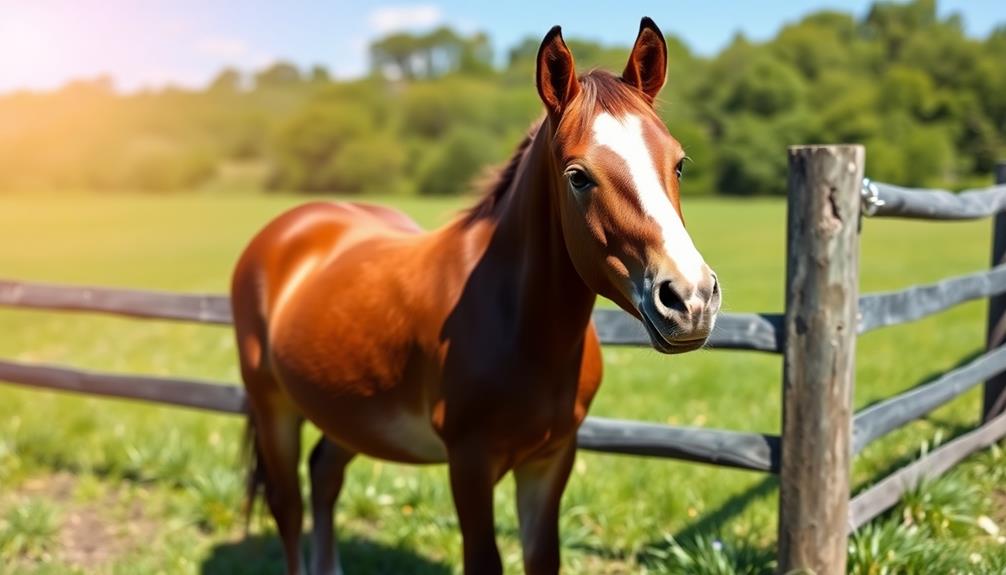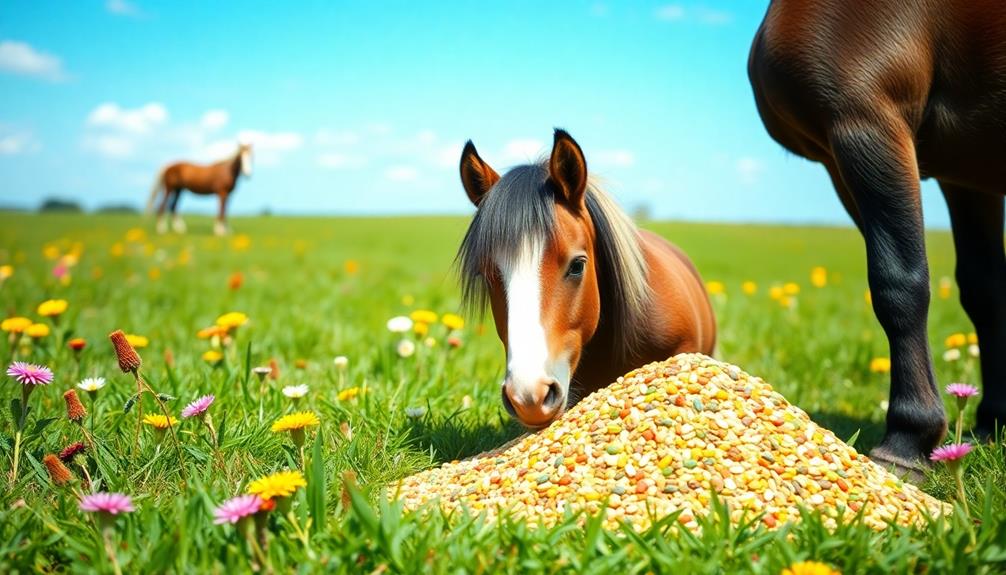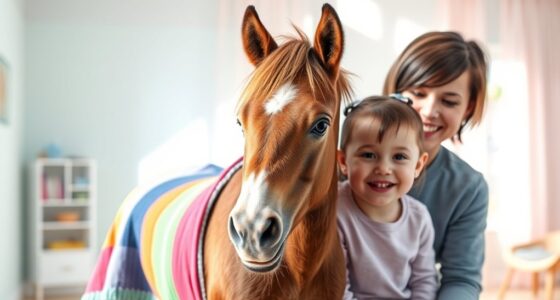A Miniature Horse Quarter Horse cross combines the best of both breeds: a manageable size and a calm temperament. Typically, these hybrids stand around 13 hands tall, making them less intimidating for children and perfect for companionship. You'll need to be mindful of their care, including regular veterinary check-ups and proper nutrition—especially for foals, who may face nursing challenges. Breeders emphasize careful planning to avoid genetic complications due to size differences. Many enthusiasts love sharing experiences about this unique cross, and there's more to uncover about their traits and community events.
Key Takeaways
- Miniature horses are classified into Type A (34 inches and under) and Type B (34-38 inches), popular for companionship and activities.
- Breeding a Miniature stallion to a Quarter Horse mare produces Quarter pony hybrids, typically around 13 hands tall with calm temperaments.
- Nursing challenges can arise due to size differences, making regular veterinary check-ups essential for the health of both mare and foal.
- Genetic complications may occur from size disparities, necessitating careful health monitoring during pregnancy and after foaling to ensure successful outcomes.
- The AEHOA supports hybrid registries and events, fostering community engagement and showcasing the talents of Miniature and Quarter Horse crosses.
Overview of Miniature Horses
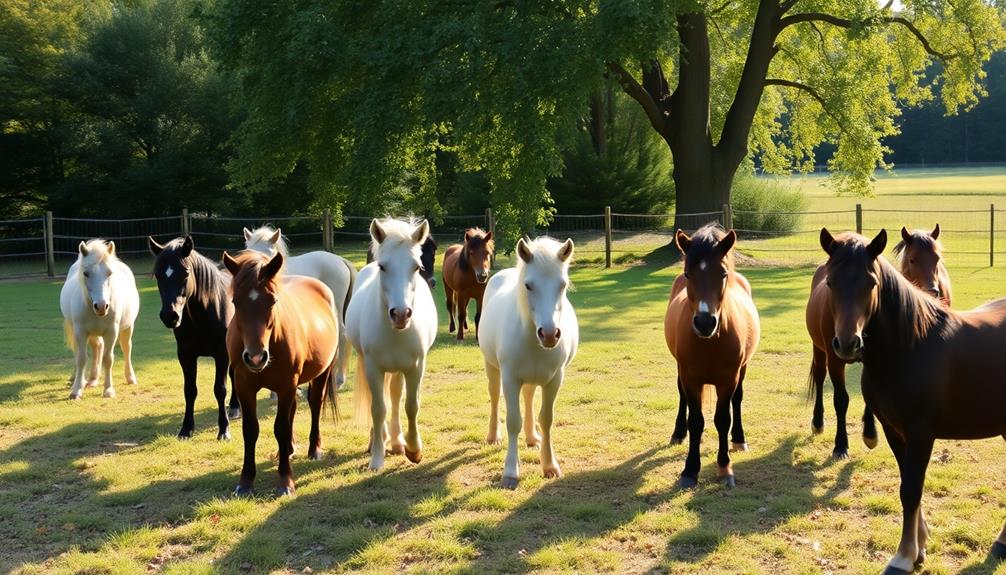
When it comes to equine companions, miniature horses offer a unique blend of charm and practicality. These delightful creatures are classified into two types based on height: Type A, measuring 34 inches and under, and Type B, which stands between 34 and 38 inches. Anything over 38 inches is categorized as a pony, so you'll find mini mares and quarter ponies within that distinction.
Miniature horses are distinct from full-sized horses, making them popular choices for companionship and various activities. Their smaller size means they're less intimidating, especially for children learning about horse care, promoting confidence around animals.
Essential care for these little equines includes hoof trimming, yearly de-worming, and careful management of their grazing to prevent health issues like founder.
Primarily, miniature horses serve as pleasure animals, offering cost-effective companionship to larger horses. They help maintain pastures while requiring minimal work, making them easy to care for.
With their gentle temperament and manageable needs, mini horses can be the perfect addition to any equine family, providing joy and support without the heavy demands of larger breeds.
Breeding Miniature and Quarter Horses
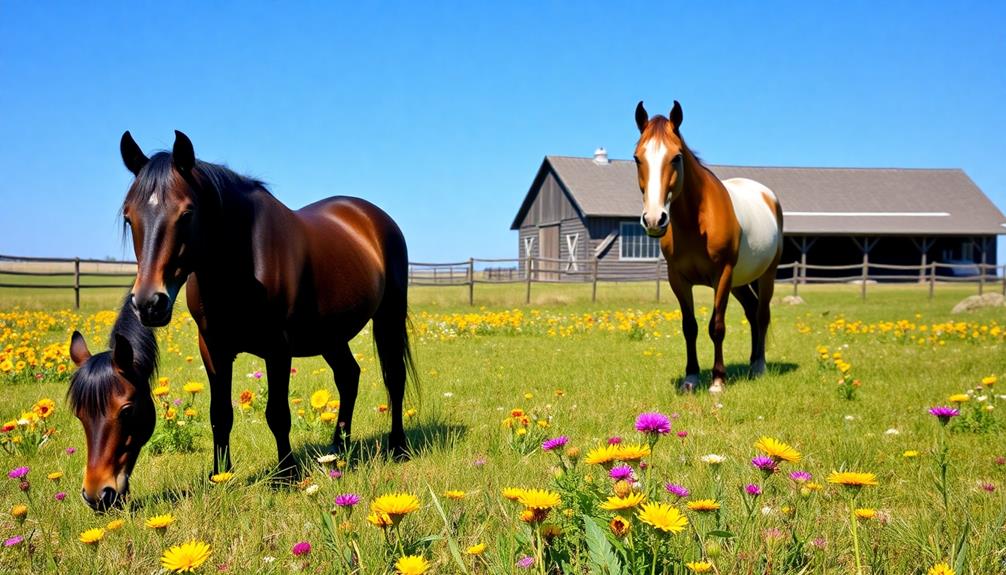
Breeding Miniature horses and Quarter Horses can yield fascinating hybrids that combine the best traits of both breeds. When you breed a Miniature stallion to a Quarter Horse mare, you typically get a hybrid known as a "Quarter pony," which usually stands around 13 hands tall. This height makes them suitable for various riding activities, especially for children.
The calm temperament of both breeds helps these hybrids avoid many of the behaviors associated with typical ponies, making them excellent mounts for young riders.
It's essential to plan carefully during the breeding process to guarantee the health of both the mare and the foal. Successful breeding practices emphasize monitoring to avoid complications that arise from any size differences between the parents and offspring.
The American Equine Miniature Horse Association (AEHOA) has even introduced a 1/8th horse registry to promote these unique hybrids and their characteristics. By staying informed and connected within the community, you'll find valuable insights to enhance your breeding experience and ensure the well-being of your Miniature and Quarter Horse crosses.
Nursing Considerations for Foals
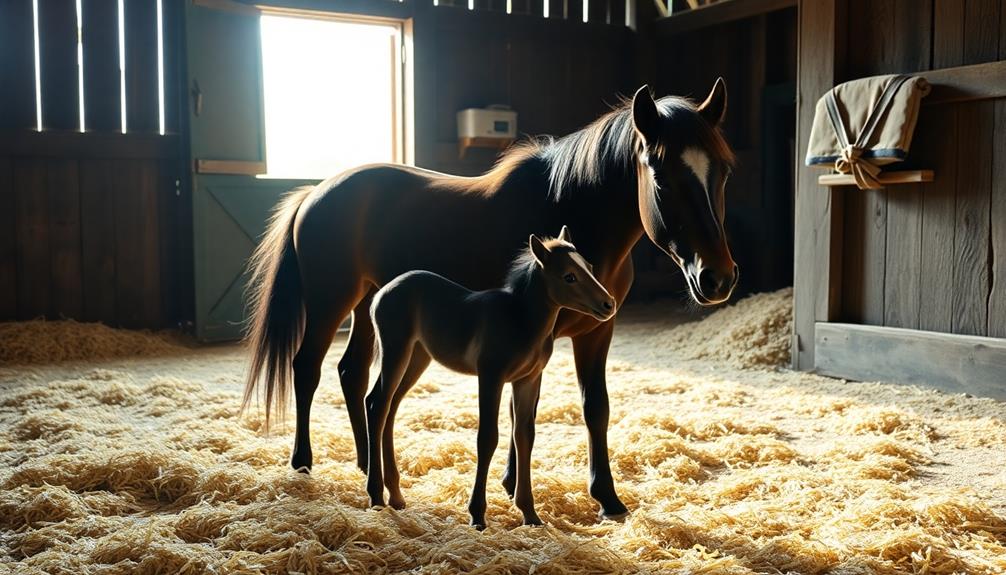
Nursing considerations for foals are important, especially when size differences between the Miniature stallion and Quarter Horse mare come into play. The nursing ability of the foal can be considerably affected if it inherits traits from the miniature stallion, resulting in a smaller offspring. If the foal is undersized, it may struggle to nurse effectively, which can lead to nutritional deficiencies.
The height and overall health of the Quarter Horse mare also matter. Larger mares typically have better nursing capabilities, making it essential to monitor their health closely during this phase. You'll need to observe the foal's nursing patterns and make sure it's getting enough milk to thrive.
Regular veterinary check-ups are crucial for evaluating both the mare and foal's health. These appointments help identify any nursing issues early on, allowing for prompt interventions if needed.
Make certain to provide adequate care and a stress-free environment to facilitate successful nursing. Being proactive in addressing any potential complications will help guarantee that your foal grows strong and healthy, maximizing its chances for a bright future.
Community Experiences and Insights
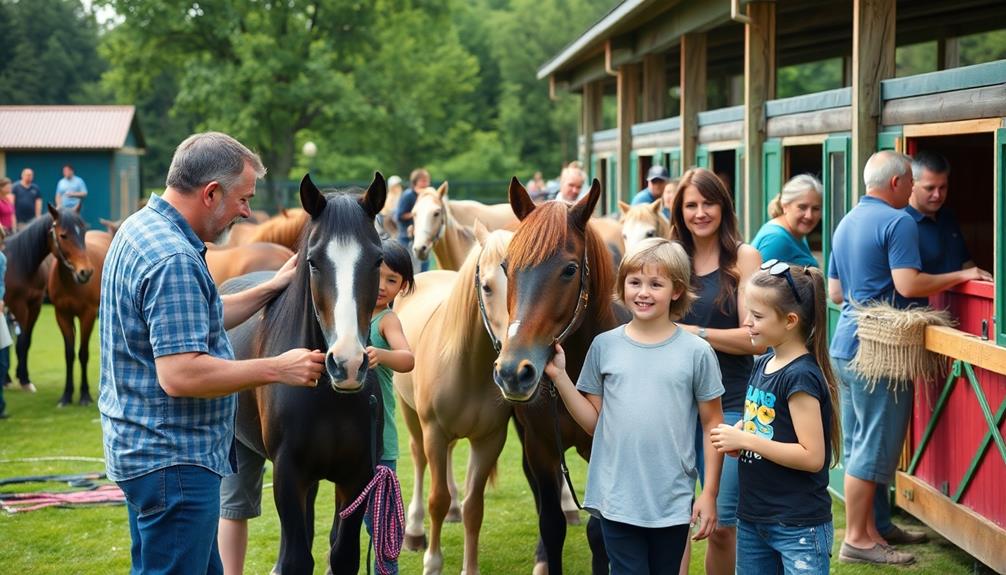
Community members have shared a wealth of experiences regarding the Miniature Horse and Quarter Horse cross, highlighting both the joys and challenges that come with this unique breeding combination. Many enthusiasts discuss the desirable traits often seen in the resulting foal, such as calm temperament and manageable size, making them great companions for children.
In online forums, participants frequently express curiosity about the characteristics of foals produced from mini stallions and full-size Quarter Horse mares. They emphasize the importance of careful monitoring, as the offspring can vary markedly in size and temperament due to genetic contributions from both parents.
Breeders share personal stories that illustrate these variations, reinforcing the idea that understanding the lineage is essential for predicting outcomes. Additionally, ongoing discussions often encourage members to share updates and photos of their foal development, fostering a supportive network within the community.
As the AEHOA recognizes this crossbreed and introduces registries for hybrid offspring, it stimulates engagement and interest among members, creating a vibrant community dedicated to exploring the potential of Miniature Horse and Quarter Horse crosses.
Registries and Hybrid Events
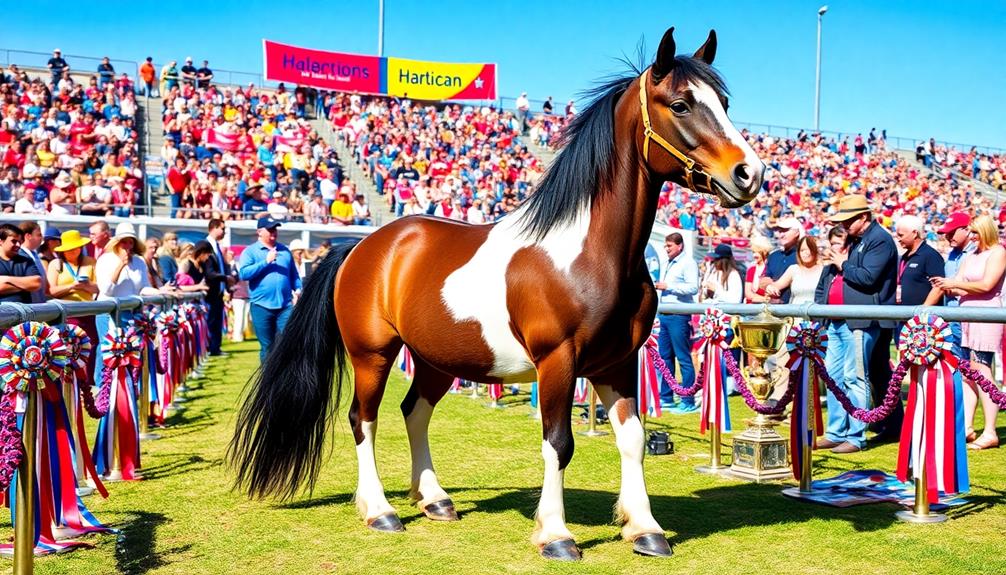
When you're exploring the world of Miniature Horse and Quarter Horse crosses, understanding the AEHOA's hybrid registries is key to recognizing your horse's pedigree.
You'll also want to check out the upcoming performance events that showcase these unique hybrids, offering great opportunities for involvement.
Engaging with the community through these events not only enhances your experience but also promotes responsible breeding practices.
AEHOA Hybrid Registries
The American Equine Miniature Horse Association (AEHOA) is dedicated to promoting the unique qualities of miniature horse hybrids, particularly those crossed with Quarter Horses.
One of the standout features of AEHOA is its specialized 1/8th horse registry, which allows you to officially register your crossbred mini horses. This registration not only validates your breeding efforts but also connects you with a community passionate about these hybrids.
Here are three reasons to get involved with AEHOA hybrid registries:
- Community Support: You'll find a network of breeders and enthusiasts keen to share their experiences and knowledge about hybrids.
- Increased Recognition: Official registration elevates the status of your mini hybrids, showcasing their unique traits and potential.
- Exciting Events: AEHOA is actively planning competitive events, like the upcoming performance track at the Mall of America, where your registered hybrids can shine.
Upcoming Performance Events
Exciting performance events are on the horizon for miniature horse enthusiasts, especially those involved with hybrids like the Miniature Horse and Quarter Horse cross.
The American Equine Miniature Horse Association (AEHOA) has introduced a 1/8th horse registry specifically for hybrids, and this opens up new opportunities for recognition and competition.
Upcoming events such as the AEHOA performance track at the Mall of America and the AEHOA Olympics will highlight the talents and versatility of miniature horses and their hybrids.
These performance events often feature categories specifically designed for hybrid offspring, allowing you to showcase their unique traits and abilities.
Participating in these events not only allows you to celebrate your miniature horse's accomplishments but also provides a fantastic networking opportunity with other enthusiasts in the community.
Fundraising efforts are underway to support breeding facilities and future events, demonstrating the community's commitment to promoting miniature horse breeding and performance.
Community Involvement Opportunities
Participating in community events, like those organized by the American Equine Miniature Horse Association (AEHOA), offers fantastic opportunities for miniature horse enthusiasts and breeders.
Engaging with fellow members not only deepens your knowledge but also strengthens your connections within the miniature horse community.
Here are three compelling reasons to get involved:
- Hybrid Recognition: The AEHOA has introduced a 1/8th horse registry specifically for Miniature Horse and Quarter Horse crosses, paving the way for greater acknowledgment of your breeding efforts.
- Exciting Events: Upcoming events, such as the performance track at the Mall of America and the AEHOA Olympics, provide a platform to showcase your miniature horses and hybrids, enhancing your experience and visibility.
- Supportive Environment: Participating fosters a community spirit, giving you access to valuable resources, discussions, and best practices for breeding, ensuring you stay informed and inspired.
Care Requirements for Miniature Horses
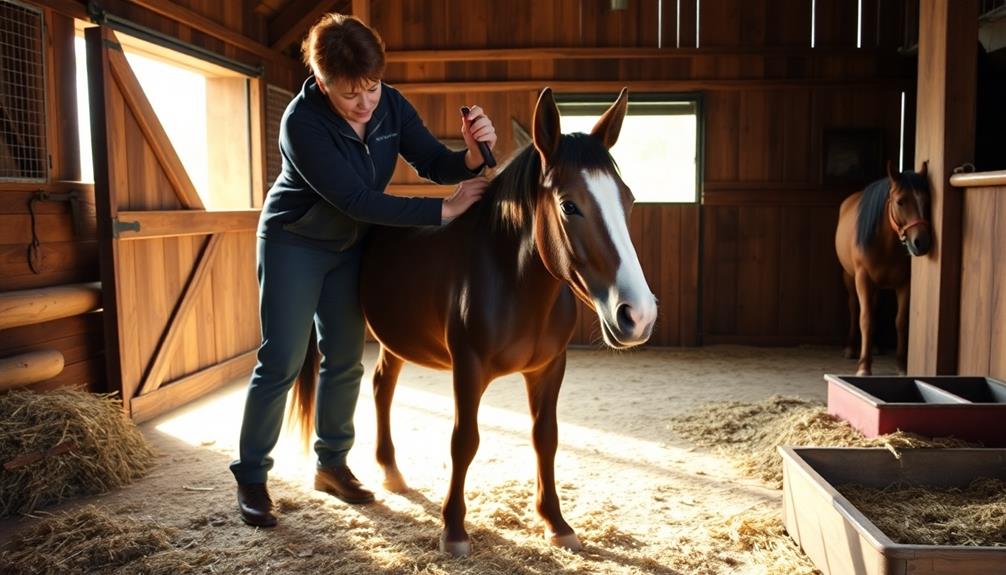
Caring for miniature horses involves several important requirements to guarantee their health and well-being. First, you need to make sure their hooves are regularly trimmed and their teeth are floated as necessary to prevent dental issues. Yearly de-worming is also essential for maintaining their overall health.
Miniature horses require a minimum of 1 acre of grazing land for every 2-3 minis. Smaller spaces can lead to health problems due to inadequate exercise and overgrazing.
Make sure they've access to clean, fresh water, aiming for about 1 gallon per 100 lbs of body weight daily, regardless of the weather.
Providing shelter is vital, even during winter, to protect them from harsh elements despite their heavy winter coats.
When it comes to grazing, careful management is key. Gradually introducing them to grass can help prevent overeating and conditions like founder.
Potential Complications and Risks
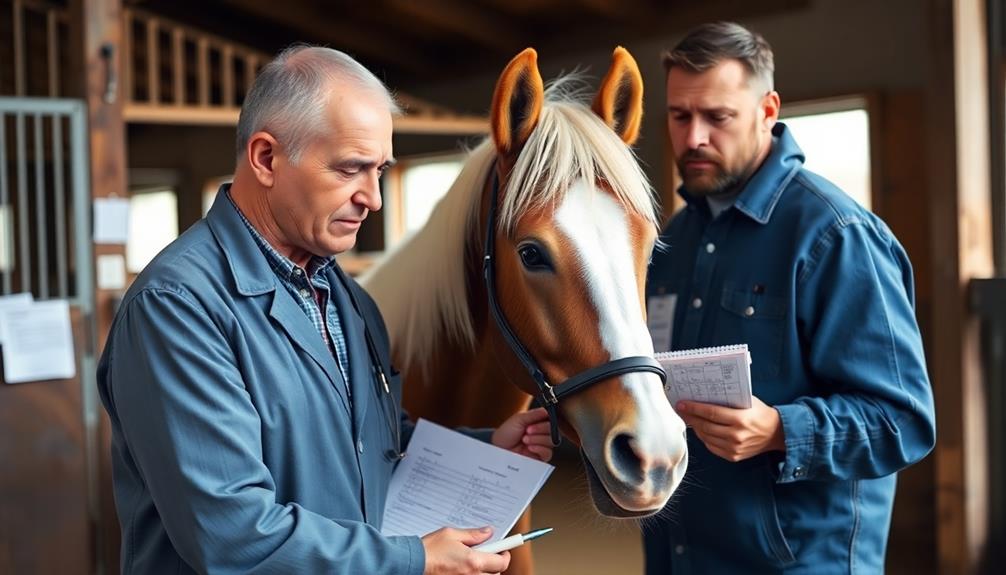
When breeding a miniature stallion to a Quarter Horse mare, you might face nursing challenges if the foal ends up undersized.
This size disparity can also lead to potential genetic complications that could affect the foal's health.
Being aware of these risks can help you take the necessary precautions during pregnancy and after foaling.
Nursing Challenges
Nursing challenges can arise from the considerable size differences between a miniature horse foal and a Quarter horse mare, creating potential complications that require careful attention.
If the foal is considerably smaller than average, it may struggle to nurse effectively. This situation can lead to several issues that need monitoring:
- Nutritional Deficiencies: A small foal mightn't receive enough milk, risking its health.
- Mare's Nursing Ability: The mare's height can hinder her ability to care for a smaller foal, making it hard for the foal to reach her udder.
- Veterinary Intervention: Close supervision may be necessary, requiring you to seek veterinary support to guarantee the foal's needs are met.
You'll need to be vigilant during the nursing process, as complications can arise quickly.
It's crucial to monitor the foal's weight and overall condition, confirming it's getting adequate nutrition.
The genetic variability between the miniature stallion and Quarter horse mare can introduce unexpected challenges during this critical time.
Being prepared and proactive can help you navigate these nursing challenges and guarantee your foal thrives despite its size.
Genetic Complications
What genetic complications should you be aware of when breeding a miniature stallion to a Quarter horse mare? The size disparity between the two breeds can lead to serious genetic issues in the offspring. If the foal is markedly smaller than the mare, it may face nursing difficulties, which can jeopardize its overall health.
Breeding such a cross requires careful monitoring during pregnancy and foaling. The likelihood of complications increases when the size difference is too great, making it essential to have regular veterinary check-ups. These assessments can help confirm pregnancy and monitor the health of both the mare and the foal.
Additionally, identifying potential genetic problems early on can lead to better outcomes for your hybrid offspring. You'll want to verify that both parents are healthy and free from hereditary conditions that could affect the foal.
Frequently Asked Questions
What Are the Disadvantages of Miniature Horses?
Miniature horses have several disadvantages. You'll face higher upkeep costs due to specialized care, and their small size makes them prone to health issues. They also require companionship and might struggle with socialization if kept alone.
What Do I Need to Know About Mini Horses?
Owning mini horses is like nurturing a delicate flower; they need special care. You'll need to manage grazing, guarantee regular hoof care, and provide adequate space. Training requires patience, but their charm makes it worthwhile.
Do Miniature Horses Need a Companion?
Yes, miniature horses need companions. They thrive socially, and having another mini or compatible animal helps reduce stress and prevents loneliness. You'll see improved behavior and emotional well-being when they have a friend by their side.
What Do You Get When You Breed a Quarter Horse and a Thoroughbred?
When you breed a Quarter Horse and a Thoroughbred, you get an extraordinary athlete! These Quarabs combine the Quarter Horse's calmness with the Thoroughbred's spirit, resulting in versatile, competitive horses perfect for multiple equestrian disciplines.
Conclusion
In conclusion, owning a miniature horse-quarter horse cross can be a rewarding adventure, much like planting a garden. Just as a diverse mix of seeds can yield a vibrant array of flowers, these hybrids combine the charm of miniatures with the strength of quarter horses. With proper care and understanding, you can nurture a unique companion that brings joy to your life. Remember, every horse has its own personality, so embrace the journey and enjoy the ride!
